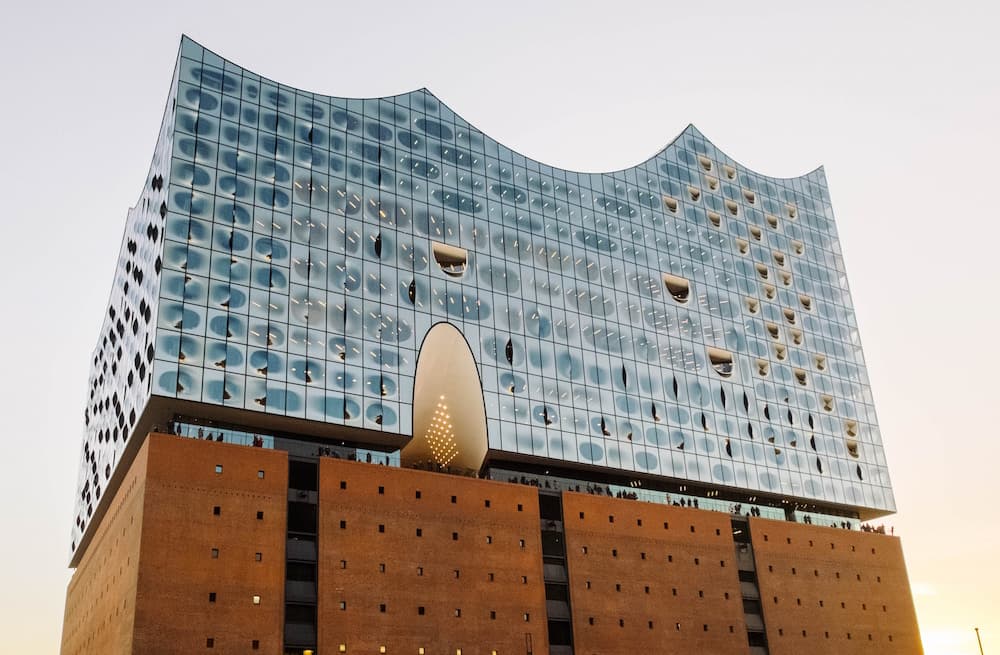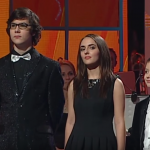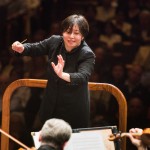In 2017, classical music mirrored aspects of the turbulent world around it. Hurricanes, Brexit, the Trump administration, and allegations of harassment all left their mark on the field. Classical music also did what it often does best: providing a haven in these restless, plugged-in times. That being said, here are ten stories that rose to the surface in 2017.
- New and Renovated Concert Halls Opened
The year 2017 was a big one for concert hall construction. It began on January 11 with the opening of the Elbphilharmonie, a glass-encased hall in Hamburg set atop a brick warehouse and towering over the city’s harbor. Designed by the Swiss architecture firm Herzog and de Meuron, the building cost about $850 million, became a must-visit for touring ensembles, and even inspired a Lego version.
March saw the opening of the Pierre Boulez Saal in Berlin, an audacious Frank Gehry-designed space managed under the auspices of the Barenboim-Said Akademie. Meanwhile, renovations dramatically reshaped Cincinnati’s 1878 Music Hall and gave Ottawa’s National Arts Centre a facelift. Officials from the New York Philharmonic and Lincoln Center, meanwhile, called off plans for a gut renovation of David Geffen Hall, saying that instead the hall will be revamped in a more gradual fashion.
2. New Operas Took a Cue From History and Film
New operas based on historical events, famous individuals or classic films drew much attention this year. Among the notable world premieres were John Adams’s Girls of the Golden West (San Francisco Opera), Mason Bates’s The (R)evolution of Steve Jobs (Santa Fe Opera), Nico Muhly’s Marnie (English National Opera) and Mohammed Fairouz’s The Dictator’s Wife (Washington National Opera). Just as notable was the range of responses to these works, with no strong critical consensus.
3. Artists and Orchestras Responded to Trump’s Travel Ban
Donald Trump’s first executive order blocking visitors from seven Muslim-majority countries ensnared a number of touring musicians in early 2017. In response, the Seattle Symphony gave a quickly arranged “Music Beyond Borders” concert featuring works by composers from countries targeted by the ban. Alan Gilbert cast his final subscription concert with the New York Philharmonic as a “Concert for Unity,” featuring guest musicians from 19 countries, including those affected by the original ban, in a performance of Mahler’s Seventh Symphony. And Deborah Borda, then the CEO of the Los Angeles Philharmonic, wrote a Los Angeles Times editorial denouncing the travel ban. (My piece on Trump’s impact on classical music is due to run shortly on MusicalAmerica.com.)
4. Powerful Men Fell
Hollywood power brokers, politicians, and media luminaries were toppled from their positions in 2017. By December, allegations of misconduct reached the insular world of classical music when multiple men came forward with accusations of sexual abuse against James Levine, which the conductor has called “unfounded.” Three weeks later, four women accused veteran conductor Charles Dutoit of sexual assault, according to the Associated Press. Dutoit has not responded as of yet.
5. Box Sets Proliferated in the Age of Streaming
Even as streaming music accounted for 62% of the U.S. music business, classical record labels continued to churn out lavish new box sets. A 225-CD Mozart set had sold more than 10,000 copies by early this year. And a 356-disc set devoted to everything Herbert von Karajan recorded for Deutsche Grammophon and Decca set a Guinness World Record for the biggest-ever box set.
6. Natural Disasters Took Their Toll
Extreme weather events, fueled at least partly by climate change, impacted arts venues in 2017. As Hurricane Harvey flooded Houston’s Wortham Theater Center, requiring repairs through at least May 2018, Houston Grand Opera moved to an improvised home at the George R. Brown Convention Center. Out west, the Luther Burbank Center for the Arts in Santa Rosa, CA was heavily damaged by wildfires while the Ojai Festival appears to have dodged a bullet as a separate fire raged through the surrounding region. And the Puerto Rico Symphony Orchestra soldiered on in the aftermath of Hurricane Maria, giving free concerts in shelters, schools and retirement homes across the island.
7. Maestro Moves
Stéphane Denève, a French conductor known for moderately adventurous programming, will replace David Robertson as music director of the St. Louis Symphony. Alan Gilbert becomes the next music director of the NDR Elbphilharmonie Orchestra in Hamburg (see above). The Canadian Bernard Labadie will become the next chief conductor of the Orchestra of St. Luke’s. While many top posts predictably went to men, the Minnesota Orchestra named Japanese maestra Akiko Fujimoto as its new assistant conductor.
8. The Brexit Effect
Great Britain’s plan to leave the European Union began to rattle the arts, as orchestras, schools and opera companies worried about the ramifications of a post-Brexit immigration clampdown. The Oxford-based European Union Baroque Orchestra announced plans to relocate to Belgium, while the London-based European Union Youth Orchestra is moving to Italy. Anti-Brexit protesters caused a ruckus at the BBC Proms for waving EU flags instead of Union Jacks. And artists including Daniel Barenboim and pianist Igor Levit made statements, musical and otherwise, against Brexit.
9. Gustavo Dudamel’s Venezuelan Setbacks
After opening Carnegie Hall’s season last year and touring Europe last spring, the Simón Bolívar Symphony Orchestra hit some road blocks when the government of President Nicolás Maduro cancelled two tours, the second one a fall jaunt through Asia. The move came after its conductor, Gustavo Dudamel, criticized the Venezuelan government for the country’s dysfunction. It raises questions about future directions of El Sistema, Venezuela’s government-funded music education program that once appeared untouchable by politics.
10. Philip Glass Turned 80
Though not strictly a “news” story, Philip Glass’s music was seemingly everywhere as the pioneering composer turned 80 on Jan. 30, 2017. As he told me in a January cover story in BBC Music Magazine, “I’m playing [piano] all the time. I’m still doing 40 or 50 concerts a year. Forty times a year means you’re practicing. It means you’re always in touch with the audience.” Below: watch a video of Icelandic pianist Víkingur Ólafsson performing in the Harpa Concert Hall in Reykjavik.
Executive Turntable
Orchestras tend to hire their managers from inside the business. Hence, as Los Angeles Philharmonic CEO Deborah Borda became the next president and CEO of the New York Philharmonic, in her place stepped in Simon Woods, the president of the Seattle Symphony since 2011. Meanwhile, Matthew VanBesien left New York to become the next president of Ann Arbor’s University Musical Society. Elsewhere, Mark C. Hanson left the Houston Symphony to become the new executive director of the San Francisco Symphony, where he succeeded longtime chief Brent Assink. Damian Woetzel, director of the Aspen Institute Arts Program and a longtime principal dancer with the New York City Ballet, is to become the next president of the Juilliard School, succeeding Joseph W. Polisi in June 2018.








Leave a Reply